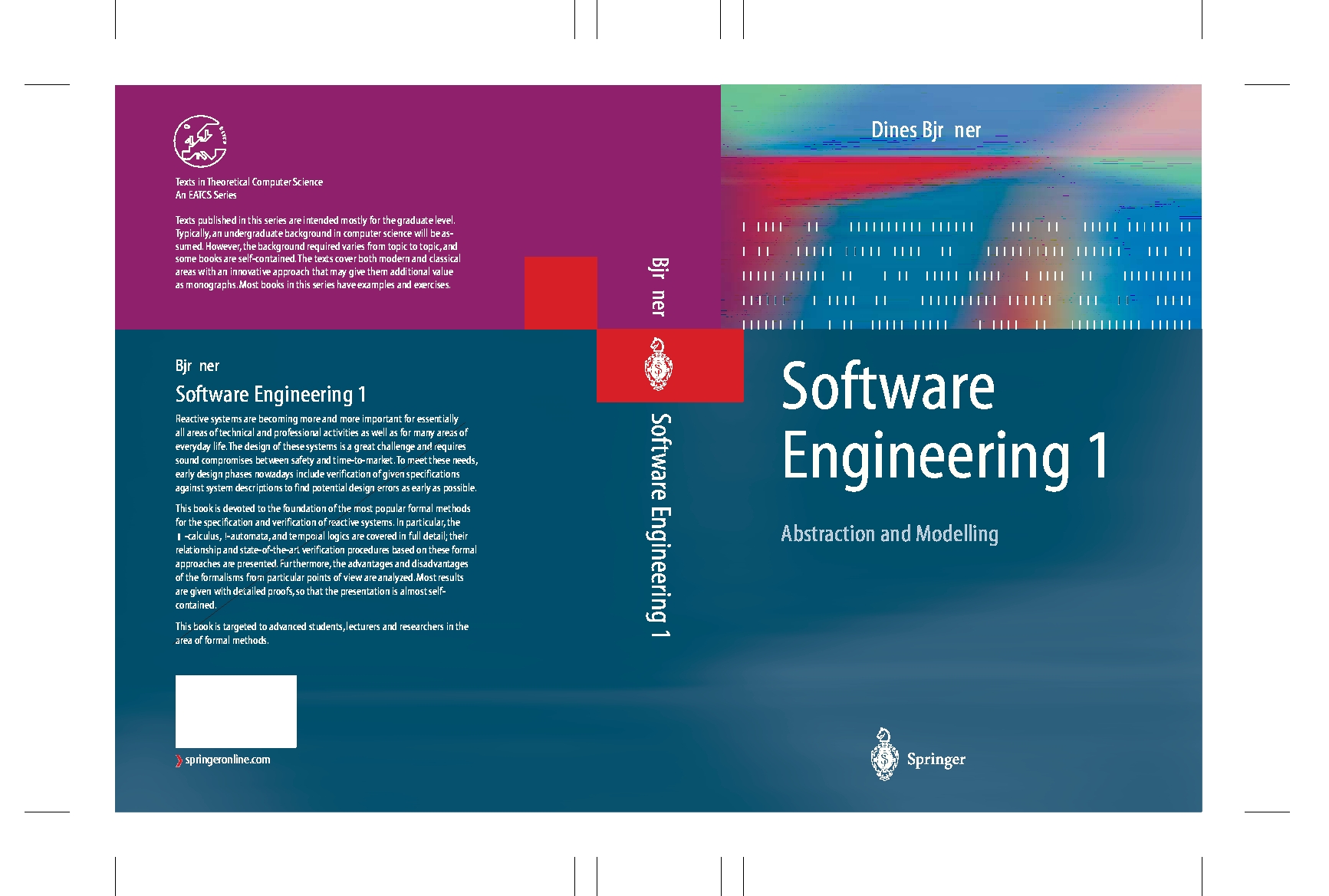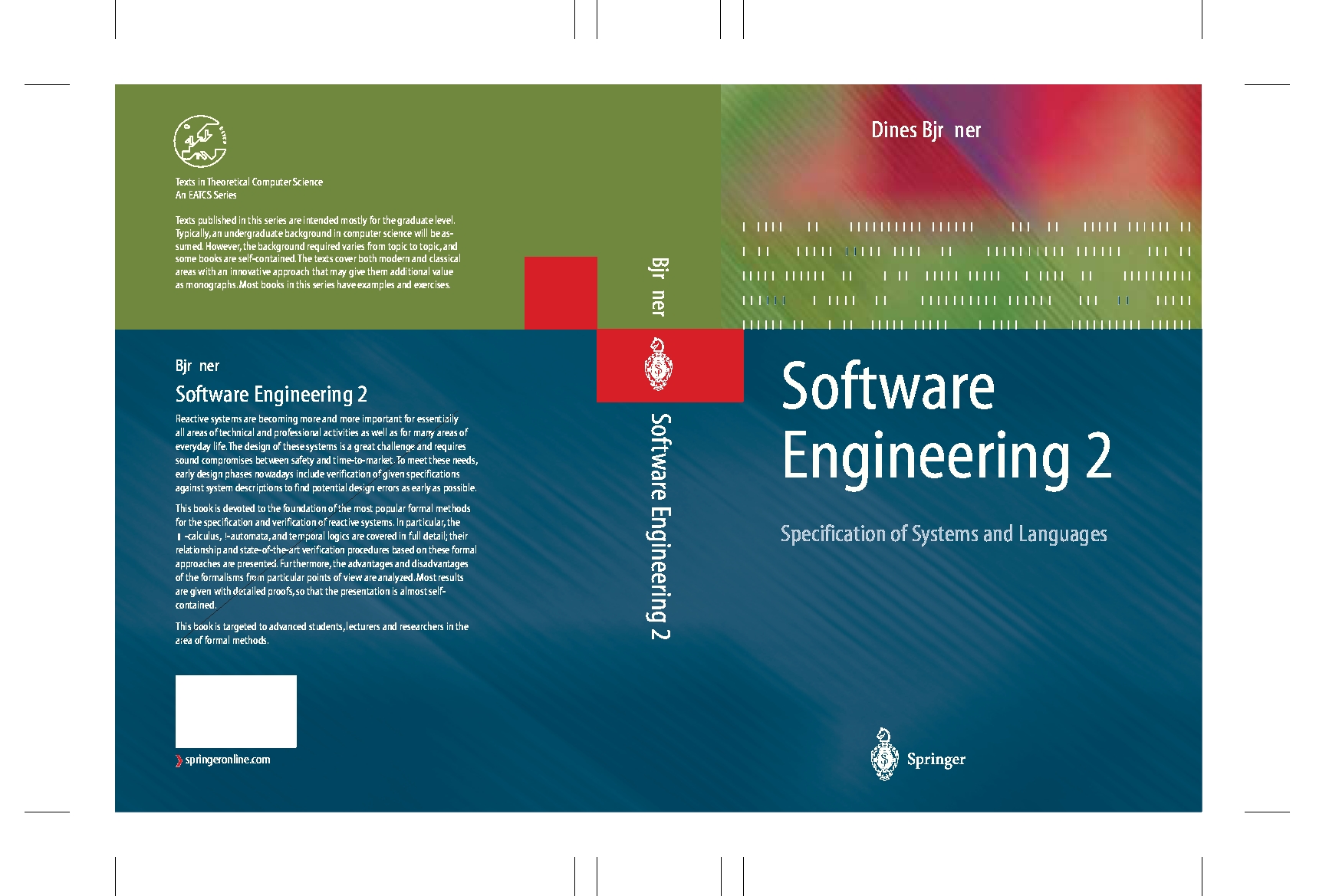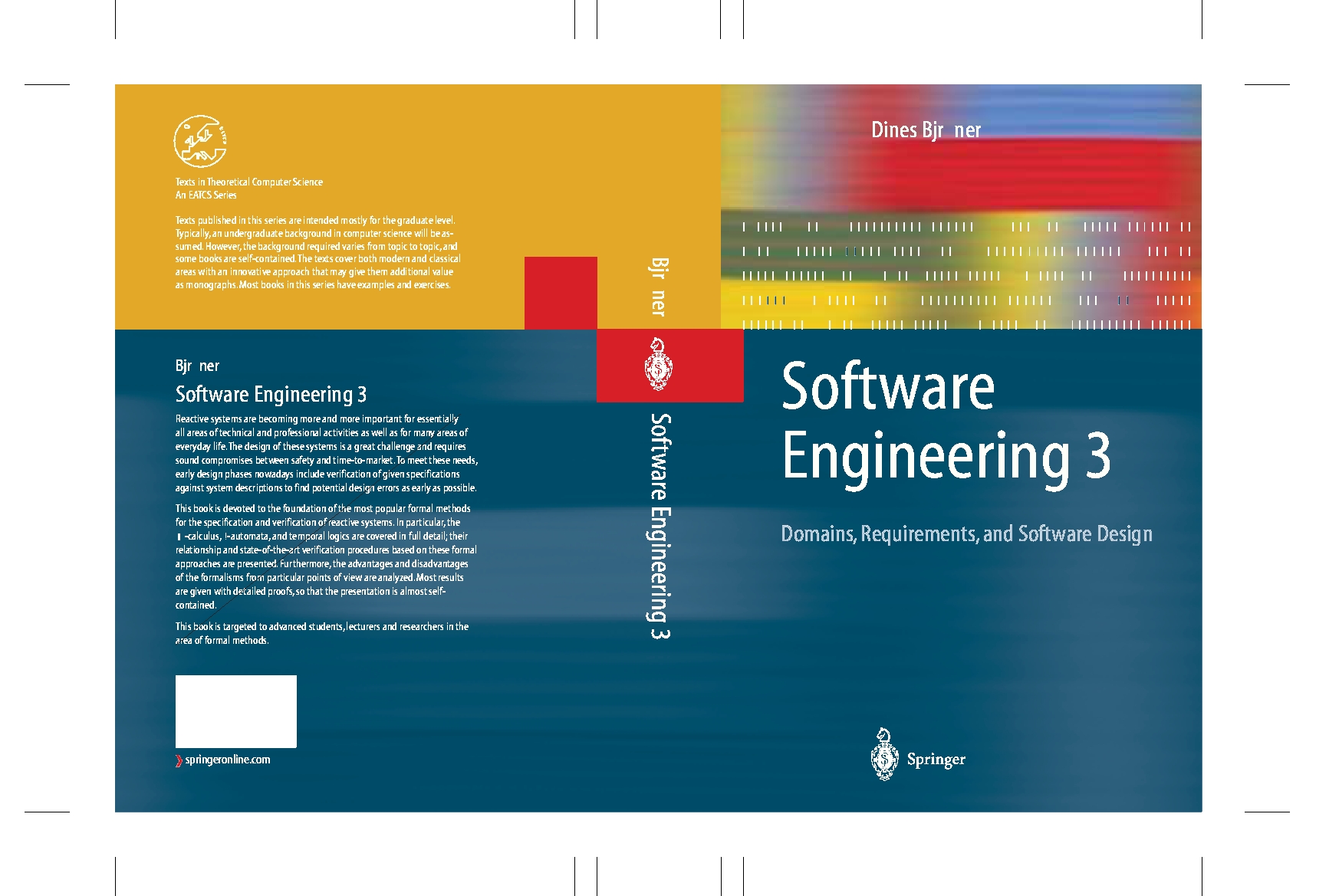Seminar Offerings
The US West [Coast], Spring 2008

PS:
This is a methodology, seminar and a discursive talk.
That is, it shows some formulas (but only as examples so that the listener may be convinced that there is, perhaps, some substance to our claims), no theorems, no proofs. Instead it postulates. The postulates are, however, firmly rooted, we think, in Vol.3 (`Domains, Requirements and Software Design') of my three volume book `Software Engineering' (Springer March 2006). First we present a summary of essentials of domain engineering, its motivation, and its modelling of abstractions of domains through the modelling of the intrinsics, support technologies, management and organisation, rules and regulations, scripts, and human behaviour of whichever domain is being described.
Then we present the essence of two (of three) aspects of requirements: the domain requirements and the interface requirements prescriptions as they relate to domain descriptions and we survey the basic operations that "turn" a domain description into a domain requirements prescription: projection, instantiation, determination, extension and fitting. An essence of interface requirements is also presented: the ``merging'' of shared entities, operations, events and behaviours of the domain with those of the machine (i.e., the hardware and software to be designed).
An objective of the talk is to summarise my work in recent years. Another objective is make a plea for what I consider a more proper approach to software development.
This is a methodology seminar talk.
Before software can be designed we must know its requirements. Before requirements can be expressed we must understand the domain. So it follows, from our dogma, that we must first establish precise descriptions of domains; then, from such descriptions, ``derive'' at least domain and interface requirements; and from those and machine requirements design the software, or, more generally, the computing systems.
We shall outline what goes into a domain description. We shall not cover other domain stages such as stakeholder identification (etc.), domain acquisition, analysis of domain acquisition units, domain verification, and domain validation. That is: before we can acquire domain knowledge we must know what are suitable structures of domain descriptions. Thus we shall outline ideas of modelling (i) the intrinsics (of a domain), (ii) the support technologies (of a domain), (iii) the management and organisation (of a domain), (iv) the rules and regulations (including [licence or contract] scripts) (of a domain), and (v) the human behaviours (of a domain).
This is a methodology colloquium talk.
Classical digital rights license languages applied to the electronic ``downloading'', payment and rendering (playing) of artistic works (for example music, literature readings and movies). In this talk we generalise such applications languages and we extend the concept of licensing to also cover work authorisation (work commitment and promises) in health care and in public government. The digital works for these two new application domains are patient medical records and public government documents.
Digital rights licensing for artistic works seeks to safeguard against piracy and to ensure proper payments for the rights to render these works. Health care and public government license languages seek to ensure transparent and professional (accurate and timely) health care, respectively `good governance'. Proper mathematical definition of licensing languages seeks to ensure smooth and correct computerised management of licenses.
In this talk we shall motivate and exemplify three license languages, their pragmatics, syntax and informal as well as formal semantics.
The referenced report is a rough sketch.
I will be working on it between now and my US trip.
This is a methodology colloquium talk.
We analyse the domain of IT systems and ``add'' to that domain the concept of IT Security Rules (and Regulations). The analysis is done, first informally, then formally.
We base our analysis on the ISO Standard: INTERNATIONAL ISO/IEC STANDARD 17799: Information technology: security techniques -- code of practice for information security management.
First we review some of the texts of that standard.
Then we "translate" some of those texts into some predicate logic.
Then we model one ("The IT Plant") aspect of the ground terms of the resulting axioms.
And finally we do the obvious: interpret the IT Security Management in the context of "The IT Plant" model, etcetera.
The talk suggest a more directed information security management research project along the lines laid out in this talk.
The referenced report is a very rough sketch.
I will be working on it between now and my US trip.
DB was Prof. of Computing Science at The Techn. Univ. of Denmark 1. Sept. 1976 - 31 March 2007. DB was with IBM R&D 1962-1976. At IBM DB worked with Gene Amdahl, John W. Backus (ffp), E.F.Codd (Relational Databases), and at the IBM Lab., Vienna, Austria - DB worked in the small team (with Peter Lucas, Hans Bekic and Cliff Jones) R&Ding VDM, the Vienna Development Method, the first ISO standardised formal method. DB co-founded Dansk Datamatik Center 1979-1989, led many EU R&D projects including the formal spec. of a semantics for Ada, the R&D of, and compilers for CHILL and Ada, and the RAISE, Rigorous Approach to Industrial Software Engineering. 1991-1997 DB was founding and first UN Director of the Macau-based UNU-IIST, the UN University's Intl. Inst. for SW Techn. DB has published over 100 papers, co-written or co-edited some 12 books, tutored some 120 MSc Thesis studens and some 20 PhD students. In 2006 DB published a three volume book and in 2007 DB edited (with Martin Henson) another book. For these see "Software Engineering" and "Logics of Specification Languages". DB is an ACM Fellow, an IEEE Fellow, Member of Academia Europaea (and holds the Chair of its Informatics Section), Member of the Russian Academy of Natural Sciences, Dr.h.c., etc., etc.



This document was generated using the LaTeX2HTML translator Version 2002-2-1 (1.71)
Copyright © 1993, 1994, 1995, 1996,
Nikos Drakos,
Computer Based Learning Unit, University of Leeds.
Copyright © 1997, 1998, 1999,
Ross Moore,
Mathematics Department, Macquarie University, Sydney.
The command line arguments were:
latex2html -split 0 -toc_depth 3 sf-talks
The translation was initiated by Dines Bjorner on 2008-01-06
Dines Bjorner 2008-01-06